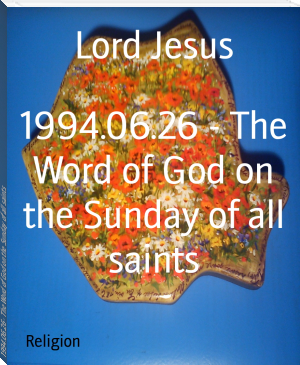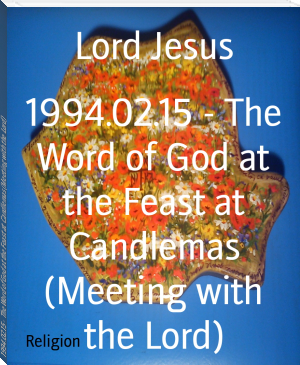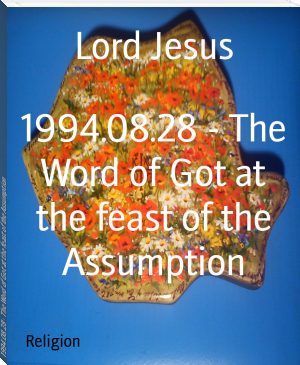Orthodoxy - G. K. Chesterton (books to read to get smarter .TXT) 📗

- Author: G. K. Chesterton
- Performer: -
Book online «Orthodoxy - G. K. Chesterton (books to read to get smarter .TXT) 📗». Author G. K. Chesterton
But the balance was not always in one man’s body as in Becket’s; the balance was often distributed over the whole body of Christendom.
Because a man prayed and fasted on the Northern snows, flowers could be flung at his festival in the Southern cities; and because fanatics drank water on the sands of Syria, men could still drink cider in the orchards of England. This is what makes Christendom at once so much more perplexing and so much more interesting than the Pagan empire; just as Amiens Cathedral is not better but more interesting than the Parthenon. If any one wants a modern proof of all this, let him consider the curious fact that, under Christianity, Europe (while remaining a unity) has broken up into individual nations.
Patriotism is a perfect example of this deliberate balancing of one emphasis against another emphasis. The instinct of the Pagan empire would have said, “You shall all be Roman citizens, and grow alike; let the German grow less slow and reverent; the Frenchmen less experimental and swift.” But the instinct of Christian Europe says, “Let the German remain slow and reverent, that the Frenchman may the more safely be swift and experimental.
We will make an equipoise out of these excesses. The absurdity called Germany shall correct the insanity called France.”
Last and most important, it is exactly this which explains what is so inexplicable to all the modern critics of the history of Christianity. I mean the monstrous wars about small points of theology, the earthquakes of emotion about a gesture or a word.
It was only a matter of an inch; but an inch is everything when you are balancing. The Church could not afford to swerve a hair’s breadth on some things if she was to continue her great and daring experiment of the irregular equilibrium. Once let one idea become less powerful and some other idea would become too powerful. It was no flock of sheep the Christian shepherd was leading, but a herd of bulls and tigers, of terrible ideals and devouring doctrines, each one of them strong enough to turn to a false religion and lay waste the world.
Remember that the Church went in specifically for dangerous ideas; she was a lion tamer. The idea of birth through a Holy Spirit, of the death of a divine being, of the forgiveness of sins, or the fulfilment of prophecies, are ideas which, any one can see, need but a touch to turn them into something blasphemous or ferocious.
The smallest link was let drop by the artificers of the Mediterranean, and the lion of ancestral pessimism burst his chain in the forgotten forests of the north. Of these theological equalisations I have to speak afterwards. Here it is enough to notice that if some small mistake were made in doctrine, huge blunders might be made in human happiness. A sentence phrased wrong about the nature of symbolism would have broken all the best statues in Europe.
A slip in the definitions might stop all the dances; might wither all the Christmas trees or break all the Easter eggs. Doctrines had to be defined within strict limits, even in order that man might enjoy general human liberties. The Church had to be careful, if only that the world might be careless.
This is the thrilling romance of Orthodoxy. People have fallen into a foolish habit of speaking of orthodoxy as something heavy, humdrum, and safe. There never was anything so perilous or so exciting as orthodoxy. It was sanity: and to be sane is more dramatic than to be mad. It was the equilibrium of a man behind madly rushing horses, seeming to stoop this way and to sway that, yet in every attitude having the grace of statuary and the accuracy of arithmetic.
The Church in its early days went fierce and fast with any warhorse; yet it is utterly unhistoric to say that she merely went mad along one idea, like a vulgar fanaticism. She swerved to left and right, so exactly as to avoid enormous obstacles. She left on one hand the huge bulk of Arianism, buttressed by all the worldly powers to make Christianity too worldly. The next instant she was swerving to avoid an orientalism, which would have made it too unworldly.
The orthodox Church never took the tame course or accepted the conventions; the orthodox Church was never respectable. It would have been easier to have accepted the earthly power of the Arians.
It would have been easy, in the Calvinistic seventeenth century, to fall into the bottomless pit of predestination. It is easy to be a madman: it is easy to be a heretic. It is always easy to let the age have its head; the difficult thing is to keep one’s own.
It is always easy to be a modernist; as it is easy to be a snob.
To have fallen into any of those open traps of error and exaggeration which fashion after fashion and sect after sect set along the historic path of Christendom—that would indeed have been simple.
It is always simple to fall; there are an infinity of angles at which one falls, only one at which one stands. To have fallen into any one of the fads from Gnosticism to Christian Science would indeed have been obvious and tame. But to have avoided them all has been one whirling adventure; and in my vision the heavenly chariot flies thundering through the ages, the dull heresies sprawling and prostrate, the wild truth reeling but erect.
VII THE ETERNAL REVOLUTIONThe following propositions have been urged: First, that some faith in our life is required even to improve it; second, that some dissatisfaction with things as they are is necessary even in order to be satisfied; third, that to have this necessary content and necessary discontent it is not sufficient to have the obvious equilibrium of the Stoic. For mere resignation has neither the gigantic levity of pleasure nor the superb intolerance of pain.
There is a vital objection to the advice merely to grin and bear it.
The objection is that if you merely bear it, you do not grin.
Greek heroes do not grin: but gargoyles do—because they are Christian.
And when a Christian is pleased, he is (in the most exact sense) frightfully pleased; his pleasure is frightful. Christ prophesied the whole of Gothic architecture in that hour when nervous and respectable people (such people as now object to barrel organs) objected to the shouting of the gutter-snipes of Jerusalem.
He said, “If these were silent, the very stones would cry out.”
Under the impulse of His spirit arose like a clamorous chorus the facades of the mediaeval cathedrals, thronged with shouting faces and open mouths. The prophecy has fulfilled itself: the very stones cry out.
If these things be conceded, though only for argument, we may take up where we left it the thread of the thought of the natural man, called by the Scotch (with regrettable familiarity), “The Old Man.” We can ask the next question so obviously in front of us. Some satisfaction is needed even to make things better.
But what do we mean by making things better? Most modern talk on this matter is a mere argument in a circle—that circle which we have already made the symbol of madness and of mere rationalism.
Evolution is only good if it produces good; good is only good if it helps evolution. The elephant stands on the tortoise, and the tortoise on the elephant.
Obviously, it will not do to take our ideal from the principle in nature; for the simple reason that (except for some human or divine theory), there is no principle in nature. For instance, the cheap anti-democrat of to-day will tell you solemnly that there is no equality in nature. He is right, but he does not see the logical addendum. There is no equality in nature; also there is no inequality in nature. Inequality, as much as equality, implies a standard of value. To read aristocracy into the anarchy of animals is just as sentimental as to read democracy into it.
Both aristocracy and democracy are human ideals: the one saying that all men are valuable, the other that some men are more valuable.
But nature does not say that cats are more valuable than mice; nature makes no remark on the subject. She does not even say that the cat is enviable or the mouse pitiable. We think the cat superior because we have (or most of us have) a particular philosophy to the effect that life is better than death. But if the mouse were a German pessimist mouse, he might not think that the cat had beaten him at all. He might think he had beaten the cat by getting to the grave first. Or he might feel that he had actually inflicted frightful punishment on the cat by keeping him alive.
Just as a microbe might feel proud of spreading a pestilence, so the pessimistic mouse might exult to think that he was renewing in the cat the torture of conscious existence. It all depends on the philosophy of the mouse. You cannot even say that there is victory or superiority in nature unless you have some doctrine about what things are superior. You cannot even say that the cat scores unless there is a system of scoring. You cannot even say that the cat gets the best of it unless there is some best to be got.
We cannot, then, get the ideal itself from nature, and as we follow here the first and natural speculation, we will leave out (for the present) the idea of getting it from God.
We must have our own vision. But the attempts of most moderns to express it are highly vague.
Some fall back simply on the clock: they talk as if mere passage through time brought some superiority; so that even a man of the first mental calibre carelessly uses the phrase that human morality is never up to date. How can anything be up to date?—
a date has no character. How can one say that Christmas celebrations are not suitable to the twenty-fifth of a month?
What the writer meant, of course, was that the majority is behind his favourite minority—or in front of it. Other vague modern people take refuge in material metaphors; in fact, this is the chief mark of vague modern people. Not daring to define their doctrine of what is good, they use physical figures of speech without stint or shame, and, what is worst of all, seem to think these cheap analogies are exquisitely spiritual and superior to the old morality.
Thus they think it intellectual to talk about things being “high.”
It is at least the reverse of intellectual; it is a mere phrase from a steeple or a weathercock. “Tommy was a good boy” is a pure philosophical statement, worthy of Plato or Aquinas. “Tommy lived the higher life” is a gross metaphor from a ten-foot rule.
This, incidentally, is almost the whole weakness of Nietzsche, whom some are representing as a bold and strong thinker.
No one will deny that he was a poetical and suggestive thinker; but he was quite the reverse of strong. He was not at all bold.





Comments (0)